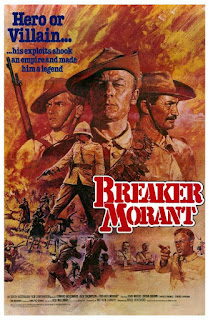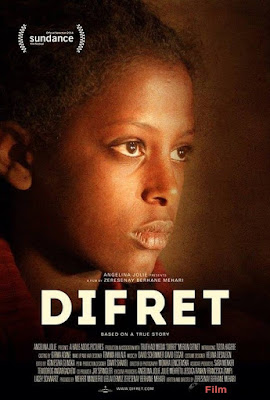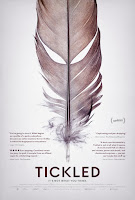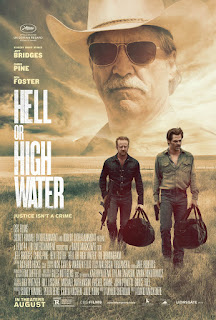Love and scandal are the best sweeteners of tea. —Henry Fielding
29 September 2016
Francofonia
I am sorry to report that this is no Russian Ark. Instead of focusing on the Louvre itself, Sokurov hones in on the German occupation of Paris during WWII and the two men who preserved the Louvre's possessions. It dwells on some interesting things – Napoléon's war spoils for one – but the film seems to lack focus.
26 September 2016
'Breaker' Morant
This was only slightly hampered by its source material as a stage play. The performances in 'Breaker' Morant are so good, however, and the plot so interesting, that I was willing to forgive its occasional awkward staginess. Edward Woodward and Jack Thompson are superb, and John Waters and Lewis Fitz-Gerald great in supporting parts.
22 September 2016
American Fascism and the Mid-1930s
So I watched this Howard Hawks movie called Barbary Coast this morning. It is from 1935 and starred the great Miriam Hopkins. Hopkins was a big star by 1935 and was nominated as Best Actress in that year for a different film, an adaptation of Thackeray's Vanity Fair called Becky Sharp.
In any case, Barbary Coast is about a young woman who comes to San Francisco during the gold rush and finds her fiancé murdered when she gets off of the boat. But because the only reason she's come to California is for gold, she very quickly hooks herself up with her fiancé's murderer, the man who stole her man's gold in the first place. This evil gangster is Edward G. Robinson, of course, and he swaggers around town taking lives and insulting women and doing his best to make everyone simultaneously uncomfortable and obedient. (He is also earringed, pomaded, and given an Italian surname so that we clearly read him as a foreigner.)
Miriam Hopkins accidentally falls in love with a naive forty-niner played by Joel McCrea who quotes Shelley to her and talks about riding ponies in Grammercy Park.
Robinson is angry, of course, and tries to have him killed, but by this time the town has rebelled. Furious with the giant thumb under which the townsfolk have been living, they lynch one of Robinson's henchmen (Brian Donlevy) and then come after Robinson himself, rifles cocked at the ready. I am sure you can guess who wins out in the end. This is old-school melodrama, and everything works out as you'd expect.
This being Howard Hawks, this is very well made old-school melodrama, and the photography in particular is gorgeous. But what has sort of stuck in craw after having seen Barbary Coast is this group of townsfolk who wind up killing Donlevy (who is, after all, a murderer). They call themselves vigilantes, and a little note on this word will, perhaps, make sense of my discomfort. Vigilante comes from the Spanish, which makes perfect sense for a movie set in the 1840s in California, but the real rise in the use of this word in Anglophone literature happens at precisely the time when Barbary Coast is released – in 1935. Run your cursor over the graph below and you'll see what I mean.
It was the lawlessness with which law and order was restored to San Francisco in the film that bothered me so much. The men with the rifles were doing the right thing, of course. They were getting revenge for their murdered friends, and they were punishing a man who was hubristically killing anyone he pleased, and they were putting power back in the hands of the people, wresting it from a lawless, greedy gangster who had only his own interests at heart. But... if the film's title is supposed to be a reference to lawless barbarianism and the rule of the gun, I don't think this group of vigilantes restores law and order in any appreciable way. Rather, they simply underline the rule of the gun and maintain the lawlessness of the land, merely transferring the power of the gun to the "good guys" and wresting that power from the "gangster".
What troubled me was that Barbary Coast seemed designed to incite this kind of violence, to ask USAmericans to take justice into their own hands. After all, if the law won't do it, who will? Why, we vigilantes, that's who! This wouldn't be so scary if this weren't 1935, a year not so far removed from the 1931-1932 trials of the Scottsboro defendants. 1935 – a year in which 2 white men and 18 black men were lynched (the last double-digit year for lynchings in the U.S.) and a year in which anticommunism had become rampant, as the the Special Committee on Un-American Activities Authorized to
Investigate Nazi Propaganda and Certain Other Propaganda Activities met in the House of Representatives under the leadership of John William McCormack and Samuel Dickstein. This decade would see a few men in the U.S. government all but completely shut down the progressive movement that comprised the Old Left.
These vigilantes aren't a lynch-mob; far from it. They're a group of men who have a legitimate grievance, who feel slighted by the men in charge, who feel marginalized by a ruling class who are telling them what to do and stealing their money. And so they get a bunch of guns and they go kill a man. They do this dispassionately and deliberately, and they do it without any ethical quandary. Barbary Coast, too, attaches no ethical dilemma to the lynching of Donlevy. It is simply justice.
I would like to return briefly to the title. Barbary Coast is not a phrase historically used to describe California or San Francisco. The phrase was generally used in reference to the Amazighen or Berber people from the north coast of Africa – modern Algeria, Tunisia, and Morocco. (The Romans used the term barbar to describe foreigners, whose language all sounded like "bar-bar" to them.) And if Barbary Coast's lynching on the west coast of North America in the 1840s seems far removed from ancient North Africa, perhaps the unmentioned but – it seems to me – clearly disavowed possibility of lynching in the African Diaspora of the American South in the 1930s allows for the title's evocation of Africa to make a bit more sense. In a land of barbarians (Barbary was best known for its pirates and its slave-traders), in a land where the government cannot be counted on to mete out justice, red-blooded Americans (Barbary Coast seemed to me to say) need to take the law into their own hands: the precise opposite, in other words, of law and order.
In any case, Barbary Coast is about a young woman who comes to San Francisco during the gold rush and finds her fiancé murdered when she gets off of the boat. But because the only reason she's come to California is for gold, she very quickly hooks herself up with her fiancé's murderer, the man who stole her man's gold in the first place. This evil gangster is Edward G. Robinson, of course, and he swaggers around town taking lives and insulting women and doing his best to make everyone simultaneously uncomfortable and obedient. (He is also earringed, pomaded, and given an Italian surname so that we clearly read him as a foreigner.)
Miriam Hopkins accidentally falls in love with a naive forty-niner played by Joel McCrea who quotes Shelley to her and talks about riding ponies in Grammercy Park.
Robinson is angry, of course, and tries to have him killed, but by this time the town has rebelled. Furious with the giant thumb under which the townsfolk have been living, they lynch one of Robinson's henchmen (Brian Donlevy) and then come after Robinson himself, rifles cocked at the ready. I am sure you can guess who wins out in the end. This is old-school melodrama, and everything works out as you'd expect.
This being Howard Hawks, this is very well made old-school melodrama, and the photography in particular is gorgeous. But what has sort of stuck in craw after having seen Barbary Coast is this group of townsfolk who wind up killing Donlevy (who is, after all, a murderer). They call themselves vigilantes, and a little note on this word will, perhaps, make sense of my discomfort. Vigilante comes from the Spanish, which makes perfect sense for a movie set in the 1840s in California, but the real rise in the use of this word in Anglophone literature happens at precisely the time when Barbary Coast is released – in 1935. Run your cursor over the graph below and you'll see what I mean.
It was the lawlessness with which law and order was restored to San Francisco in the film that bothered me so much. The men with the rifles were doing the right thing, of course. They were getting revenge for their murdered friends, and they were punishing a man who was hubristically killing anyone he pleased, and they were putting power back in the hands of the people, wresting it from a lawless, greedy gangster who had only his own interests at heart. But... if the film's title is supposed to be a reference to lawless barbarianism and the rule of the gun, I don't think this group of vigilantes restores law and order in any appreciable way. Rather, they simply underline the rule of the gun and maintain the lawlessness of the land, merely transferring the power of the gun to the "good guys" and wresting that power from the "gangster".
 |
| Ms. Hopkins Making the Most of It |
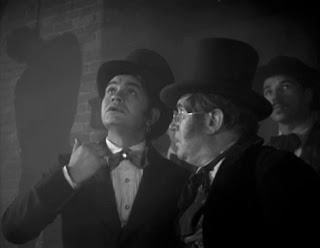 |
| Robinson Looks Up at the Lynched Donlevy |
I would like to return briefly to the title. Barbary Coast is not a phrase historically used to describe California or San Francisco. The phrase was generally used in reference to the Amazighen or Berber people from the north coast of Africa – modern Algeria, Tunisia, and Morocco. (The Romans used the term barbar to describe foreigners, whose language all sounded like "bar-bar" to them.) And if Barbary Coast's lynching on the west coast of North America in the 1840s seems far removed from ancient North Africa, perhaps the unmentioned but – it seems to me – clearly disavowed possibility of lynching in the African Diaspora of the American South in the 1930s allows for the title's evocation of Africa to make a bit more sense. In a land of barbarians (Barbary was best known for its pirates and its slave-traders), in a land where the government cannot be counted on to mete out justice, red-blooded Americans (Barbary Coast seemed to me to say) need to take the law into their own hands: the precise opposite, in other words, of law and order.
Difret
This movie out of Ethiopia – from director Zeresenay Mehari – was well intentioned but clunky. If this movie were about the kind of great work that this center for women lawyers could do, it would be much much better, but the film is more about justice in the abstract, and discusses an issue (the rape and forced marriage of a teenage girl) on which most of us can agree. And in that case, it doesn't feel like much of a movie.
19 September 2016
In Which a Crooked Cop Ponders Doing the "Right Thing"
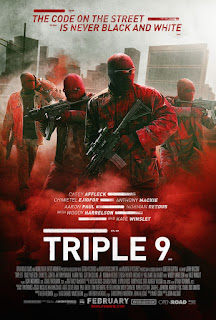 I found John Hillcoat's Triple 9 basically unwatchable.
I found John Hillcoat's Triple 9 basically unwatchable.Or, well, I guess that isn't true. It isn't unwatchable. But what it is is Woody Harrelson doing a lot of yelling, Chiwetel Ejiofor doing a lot of yelling, Anthony Mackie, doing his best to make the movie into something interesting, Kate Winslet doing a Russian accent, and Casey Affleck having a lot of feelings.
It has a cool poster, but I was bored.
This is supposed to be an action/heist/crime kind of thing, and that's fine as far as it goes. Triple 9 has three big heist-shootout set-pieces and all of them are also fairly interesting, but these set pieces hang on a scaffolding that is simply without interest – Russian mafiosos with corpses in their trunks, crooked cops who are using their positions and expertise to pull off criminal activities, stupid ex-cops who seem to have no idea how to succeed at the criminal enterprises they've planned, and really dumb gangsters for hire who have no leverage with the people for whom they work but who think they have lots of power, mysterious codes held by the Department of Homeland Security. Who cares.
And another thing: Am I supposed to enjoy myself while I watch a bunch of crooked cops kill civilians while they use military and police training to get away with stealing shit that isn't theirs? And then am I supposed to feel better about all of this because a couple of good cops (who are actually also fairly crooked dudes themselves) bring these "rogue" cops to "justice" – especially when they don't put these bad cops or the police force they serve on trial but instead simply kill them? Triple 9 seems invested in convincing us not only that the good guys will win in the end, but also that justice is poetic, that the bad guys get what is coming to them, and that we can go on about our business without looking under the hood. Am I supposed to believe that lawlessly executing "bad guys" is somehow restoring law and order? And am I supposed to think that a coverup is really what we all need? No thanks.
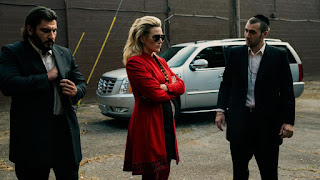 |
| Ms. Winslet and her heavies |
Will Casey Affleck and Woody Harrelson figure it out before it all ends? Will Putin let the Russian mafia boss out of the gulag after he gets the DHS codes? Or will everyone die in a giant pile-up of bodies like a Jacobean tragedy? I did actually watch it to the end, but I suspect I won't be able to remember anything about this asinine movie in a month or so. Avoid.
18 September 2016
The Club
 Pablo Larraín has two movies that will be released in the U.S. in 2016. Look for Neruda in December (Neruda, like El Club was last year, is Chile's submission to the Academy Awards Foreign Language Film category for 2016). Larraín also seems, at this point, to be the one Chilean director whose films are getting imported into the U.S. market with regularity.
Pablo Larraín has two movies that will be released in the U.S. in 2016. Look for Neruda in December (Neruda, like El Club was last year, is Chile's submission to the Academy Awards Foreign Language Film category for 2016). Larraín also seems, at this point, to be the one Chilean director whose films are getting imported into the U.S. market with regularity.El Club follows a group of priests and a nun who are living in an isolated Chilean town in a kind of home for disgraced clergy, men and women whom the Catholic church wants to take care of, but whom it no longer wants contacting parishioners.
The men and one woman in the eponymous club are unbelievably selfish, entitled individuals, and the film displays its characters unsparingly and without sympathy, but... at the same time, the movie seems to rest on and enjoy the success of these characters, even while condemning their behaviors.
El Club is a portrait of evil, psychopathy, and cruelty. The film also tries to describe tragedy in many ways, but for me it fell short of this because it didn't sympathize with victims of violence as much as it aligned itself with its perpetrators by asking us to enjoy their evil machinations.
I am not sure that this is what Larraín intended, but it is what I saw when I watched the movie.
13 September 2016
Tickled
Tickled is perhaps the weirdest thing I've seen this year. The filmmaking itself is rather frustrating and has a lot of limitations, but the content is... fascinating, jawdropping, perplexing in the extreme.
Welcome to the world of competitive endurance tickling.
You won't be able to stop talking about it.
In fact, what the filmmakers stumble upon is so puzzling, so bizarre, that I am not going to say anything else about it. But this is one strange story.
*Shout out to my friend Chris who convinced me to watch this, and to my local independent theatre for carrying it.
Welcome to the world of competitive endurance tickling.
You won't be able to stop talking about it.
In fact, what the filmmakers stumble upon is so puzzling, so bizarre, that I am not going to say anything else about it. But this is one strange story.
*Shout out to my friend Chris who convinced me to watch this, and to my local independent theatre for carrying it.
12 September 2016
Serious and Sentimental
You've probably heard good things about Hell or High Water, the new Texas-based crime film from Scottish director David Mackenzie. Everything you've heard is true. Hell or High Water is a superbly balanced mix of intensity, comedy, and thoughtfulness. This is a heist film starring Ben Foster and Chris Pine as the criminals and Jeff Bridges (still cranking out excellent performances) and Gil Birmingham as the Rangers trying to catch the criminals.
What is perhaps most intriguing about Hell or High Water is the way the film distinguishes these two, though. Many a heist film in the twenty-first century is interested in framing criminals and law enforcement as identical forces, more or less equally matched and more or less morally equivalent. But in Mackenzie's film, the criminals are dirt poor, totally broke – and law enforcement is well funded, obviously the protectors of a civilization that the film equates with the middle-class. This difference between the two forces undergirds the entire film, but is almost never discussed in a way that felt to me didactic. There is a moment in the film's third act, for example, when Hell or High Water finally visits Jeff Bridges' house. The camera sits, quietly looking over a green, well-manicured lawn onto a tidy suburban street. It takes a second to sink in: green grass. We hadn't seen anything like this for the entirety of the film – the majority of the film takes place in burning fields and deserted trailers, in cheap restaurants, abandoned banks, and depressed townships – and now here it is, a beautiful irrigated lawn. This is a place the film's criminals could never have hoped they could live.
The acting in Hell or High Water is excellent across the board. The first person we see is Dale Dickey, and as soon as I saw her I was delighted. She's an excellent character actress, and beginning with her boded well for the film. Bridges is in top form (he's very funny in this, in fact), and the leads (Foster and Pine) are doing excellent character work. I know Foster is not everyone's cup of tea, but I love him. He's energetic and engaging, and he has a way of being an asshole with a heart that I find very moving. And let's take a moment and give props to Chris Pine. This is an actor who is the star of an enormous franchise; he plays James Tiberius Kirk for god's sake. And yet he constantly does movies like this, much smaller character parts (like last year's Z for Zachariah) where he is delving deep into intriguing characters. One of my favorite performances in Hell or High Water, though, is Katy Mixon as a sweet waitress taking to make ends meet. Mixon brings everything to this little part and creates a beautiful character.
It is Mackenzie's directing and Taylor Sheridan's script, though, that are the real standouts of Hell or High Water. Both have done excellent work here. This is a tightly plotted, emotionally moving film that surprises even when it seems to move in predictable ways, and that leaves room for deep character development even as it often functions in a high-octane, heavy action mode. It's just excellently done.
What is perhaps most intriguing about Hell or High Water is the way the film distinguishes these two, though. Many a heist film in the twenty-first century is interested in framing criminals and law enforcement as identical forces, more or less equally matched and more or less morally equivalent. But in Mackenzie's film, the criminals are dirt poor, totally broke – and law enforcement is well funded, obviously the protectors of a civilization that the film equates with the middle-class. This difference between the two forces undergirds the entire film, but is almost never discussed in a way that felt to me didactic. There is a moment in the film's third act, for example, when Hell or High Water finally visits Jeff Bridges' house. The camera sits, quietly looking over a green, well-manicured lawn onto a tidy suburban street. It takes a second to sink in: green grass. We hadn't seen anything like this for the entirety of the film – the majority of the film takes place in burning fields and deserted trailers, in cheap restaurants, abandoned banks, and depressed townships – and now here it is, a beautiful irrigated lawn. This is a place the film's criminals could never have hoped they could live.
 |
| Mr. Foster and Mr. Pine. |
It is Mackenzie's directing and Taylor Sheridan's script, though, that are the real standouts of Hell or High Water. Both have done excellent work here. This is a tightly plotted, emotionally moving film that surprises even when it seems to move in predictable ways, and that leaves room for deep character development even as it often functions in a high-octane, heavy action mode. It's just excellently done.
* * *
And then last night I opted for something sentimental. A based-on-a-true-story kind of conquer-your-demons thing about a Māori chess champion dealing with schizophrenia and poverty. I watched The Dark Horse for its star, Cliff Curtis, whom I almost always love, but I was gritting my teeth in preparation for the film to be "inspirational" and "heartwarming". I am almost never interested in this kind of sentimental narrative.
This is a story about a down-on-his-luck man who gets a second chance at life teaching chess to poor kids, many of them homeless, orphaned, and hungry. Meanwhile, he must battle poverty as well as his own mental health, which is precarious, and deal with his brother's masculinist, violent treatment of his nephew Mana, who comes to depend on his unstable uncle.
But The Dark Horse is better than its genre at almost every turn. Curtis is good, even if the plot is full of clichés, and he is supported admirably by Wayne Hapi, Kirk Torrance, and especially James Rolleston (who is really fantastic). I really liked The Dark Horse and found it engaging throughout, even if I already knew all of the moves it was going to make.
04 September 2016
Lynch's Dune
I don't like David Lynch in the first place (sacrilege! I know!), but this film felt particularly disconnected and arbitrary. In fact, it seems to me like simply a bad adaptation of a necessarily much longer, more complicated novel. Lynch just tried unsuccessfully to shove all of it into the movie. One does see where George Miller got his villains from, though. Mad Max: Fury Road is feeling even more derivative than usual after this movie.
Labyrinth of Lies
Giulio Ricciarelli's Im Labyrinth des Schweigens is a totally conventional procedural version of the first trial of the SS at Auschwitz.
Labyrinth of Lies certainly isn't boring, I'll give it that, mostly because I sort of couldn't believe that this protagonist was doing what he was doing. (A character refers to him as "greenhorn" through most of the film, and this fits for most of the film.) Still, this is a film in which a character discovers what happened at Auschwitz. It feels as though it is rather an impossible task to find interest in someone figuring all of this out. The film takes places in the early 1960s, so I get how this historically could have happened, I am just not quite sure that there is any way to make all of this detective work actually interesting in 2016, or what the import of all of this procedural work is in the present day.
The acting is good, and Alexander Fehling is great in the main role, but there is not really much here in the way either of moviemaking or insight.
Labyrinth of Lies certainly isn't boring, I'll give it that, mostly because I sort of couldn't believe that this protagonist was doing what he was doing. (A character refers to him as "greenhorn" through most of the film, and this fits for most of the film.) Still, this is a film in which a character discovers what happened at Auschwitz. It feels as though it is rather an impossible task to find interest in someone figuring all of this out. The film takes places in the early 1960s, so I get how this historically could have happened, I am just not quite sure that there is any way to make all of this detective work actually interesting in 2016, or what the import of all of this procedural work is in the present day.
The acting is good, and Alexander Fehling is great in the main role, but there is not really much here in the way either of moviemaking or insight.
03 September 2016
Elimination Dance Orlando
 Elimination Dance Orlando
Elimination Dance Orlando After Michael Ondaatje
Men who drag their feet
Men in tight jeans who wear pointy dress shoes and carry laptops in heavy messenger bags
Men who spit in public
Men sipping cans of soda gingerly through drinking straws
Men with Puka shell necklaces tight at their throats
Big men walking little dogs
Guys who sit in the booth beside their dinner companions
Men with unkempt beards who wear pajama bottoms out of the house
Men who confess that they're smitten
~ ~
Delivery boys tucking their Polos into belted khaki shorts
Men who go barefoot in the rain
Men who have winked at me
~ ~
Men smoking cigars with grins on their faces
Young men who've never heard of the Bauhaus
Men with very thin arms
Guys in flip-flops with little hempen anklets
Men seductively licking chocolate chip ice cream cones
Men loudly clearing their throats
Men who are running because they are (apparently) very late for an appointment
Men bearing bottles of gin
This guy. With the devil in his eyes
01 September 2016
Cemetery of Splendour
Cemetery of Splendour (รักที่ขอนแก่น) is much sweeter than Weerasethakul's other movies, or at least it seemed so to me. Or maybe I mean that it is warmer or kinder. Obviously, if you aren't into Weerasethakul you won't be into this – it is slow and thoughtful. I really, really liked this one, though. Indeed, much more than the earlier films of his that I've seen. It's beautiful.
Subscribe to:
Posts (Atom)

